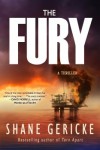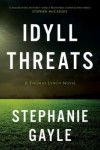

September 14 – 20: “Consistency, logic, commas?”
 This week we sit down with ITW Members Lisa von Biela, Baron R. Birthcher, Lynn Cahoon, Stephanie Gayle and Shane Gericke, and ask: “What do you value most in a copy editor? Consistency, logic, commas?”
This week we sit down with ITW Members Lisa von Biela, Baron R. Birthcher, Lynn Cahoon, Stephanie Gayle and Shane Gericke, and ask: “What do you value most in a copy editor? Consistency, logic, commas?”
~~~~~
 Shane Gericke, whose last name is improbably pronounced YER-kee, spent two decades as a newspaper editor, most prominently at the Chicago Sun-Times, before turning to fiction. He keeps his hand in nonfiction by writing for digital media. An original member of International Thriller Writers, he was chairman of the ThrillerFest literary festival in New York City and founding director of its agent-author matching program, PitchFest. He’s judged the Edgar, Thriller, MWA, and St. Martin’s awards, and belongs to Mystery Writers of America and the Society of Midland Authors.
Shane Gericke, whose last name is improbably pronounced YER-kee, spent two decades as a newspaper editor, most prominently at the Chicago Sun-Times, before turning to fiction. He keeps his hand in nonfiction by writing for digital media. An original member of International Thriller Writers, he was chairman of the ThrillerFest literary festival in New York City and founding director of its agent-author matching program, PitchFest. He’s judged the Edgar, Thriller, MWA, and St. Martin’s awards, and belongs to Mystery Writers of America and the Society of Midland Authors.
 Stephanie Gayle (Arlington, MA) is the author of My Summer of Southern Discomfort, which was chosen as one of Redbook’s Top Ten Summer Reads and was a Book Sense monthly pick. Gayle has also published stories and narrative nonfiction pieces, including two Pushcart Prize nominees.
Stephanie Gayle (Arlington, MA) is the author of My Summer of Southern Discomfort, which was chosen as one of Redbook’s Top Ten Summer Reads and was a Book Sense monthly pick. Gayle has also published stories and narrative nonfiction pieces, including two Pushcart Prize nominees.
 Baron R. Birtcher spent a number of years as a professional musician, and founded an independent record label and management company. Critics have hailed his writing as “The real deal” (Publishers Weekly) and his plots as “Taut, gritty and powerfully controlled” (Kirkus Reviews). His first two Mike Travis novels, Roadhouse Blues and Ruby Tuesday were Los Angeles Times and IMBA bestsellers. Angels Fall, the third installment of the acclaimed series, was nominated for the “Lefty” Award by Left Coast Crime. Rain Dogs, his first stand-alone, was nominated for both the Claymore and Silver Falchion Awards.
Baron R. Birtcher spent a number of years as a professional musician, and founded an independent record label and management company. Critics have hailed his writing as “The real deal” (Publishers Weekly) and his plots as “Taut, gritty and powerfully controlled” (Kirkus Reviews). His first two Mike Travis novels, Roadhouse Blues and Ruby Tuesday were Los Angeles Times and IMBA bestsellers. Angels Fall, the third installment of the acclaimed series, was nominated for the “Lefty” Award by Left Coast Crime. Rain Dogs, his first stand-alone, was nominated for both the Claymore and Silver Falchion Awards.
 New York Times and USA Today best-selling author, Lynn Cahoon is an Idaho expat. She grew up living the small town life she now loves to write about. Currently, she’s living with her husband and two fur babies in a small historic town on the banks of the Mississippi river where her imagination tends to wander. Guidebook to Murder, Book 1 of the Tourist Trap series won the 2015 Reader’s Crown award for Mystery Fiction.
New York Times and USA Today best-selling author, Lynn Cahoon is an Idaho expat. She grew up living the small town life she now loves to write about. Currently, she’s living with her husband and two fur babies in a small historic town on the banks of the Mississippi river where her imagination tends to wander. Guidebook to Murder, Book 1 of the Tourist Trap series won the 2015 Reader’s Crown award for Mystery Fiction.
 Lisa von Biela began writing dark fiction just after the turn of the century. Her very first short story appeared in The Edge in 2002. After working in IT for 25 years, Lisa dropped out of everything—including writing—to attend the University of Minnesota Law School. She graduated magna cum laude in 2009, and now practices law and writes in the Seattle area. On the writing front, she’s made up for lost time since law school and is now the author of the novels THE GENESIS CODE, THE JANUS LEGACY, BLOCKBUSTER, and BROKEN CHAIN, as well as the novellas ASH AND BONE and SKINSHIFT.
Lisa von Biela began writing dark fiction just after the turn of the century. Her very first short story appeared in The Edge in 2002. After working in IT for 25 years, Lisa dropped out of everything—including writing—to attend the University of Minnesota Law School. She graduated magna cum laude in 2009, and now practices law and writes in the Seattle area. On the writing front, she’s made up for lost time since law school and is now the author of the novels THE GENESIS CODE, THE JANUS LEGACY, BLOCKBUSTER, and BROKEN CHAIN, as well as the novellas ASH AND BONE and SKINSHIFT.
- LAST GIRL MISSING with K.L. Murphy - July 25, 2024
- CHILD OF DUST with Yigal Zur - July 25, 2024
- THE RAVENWOOD CONSPIRACY with Michael Siverling - July 19, 2024
